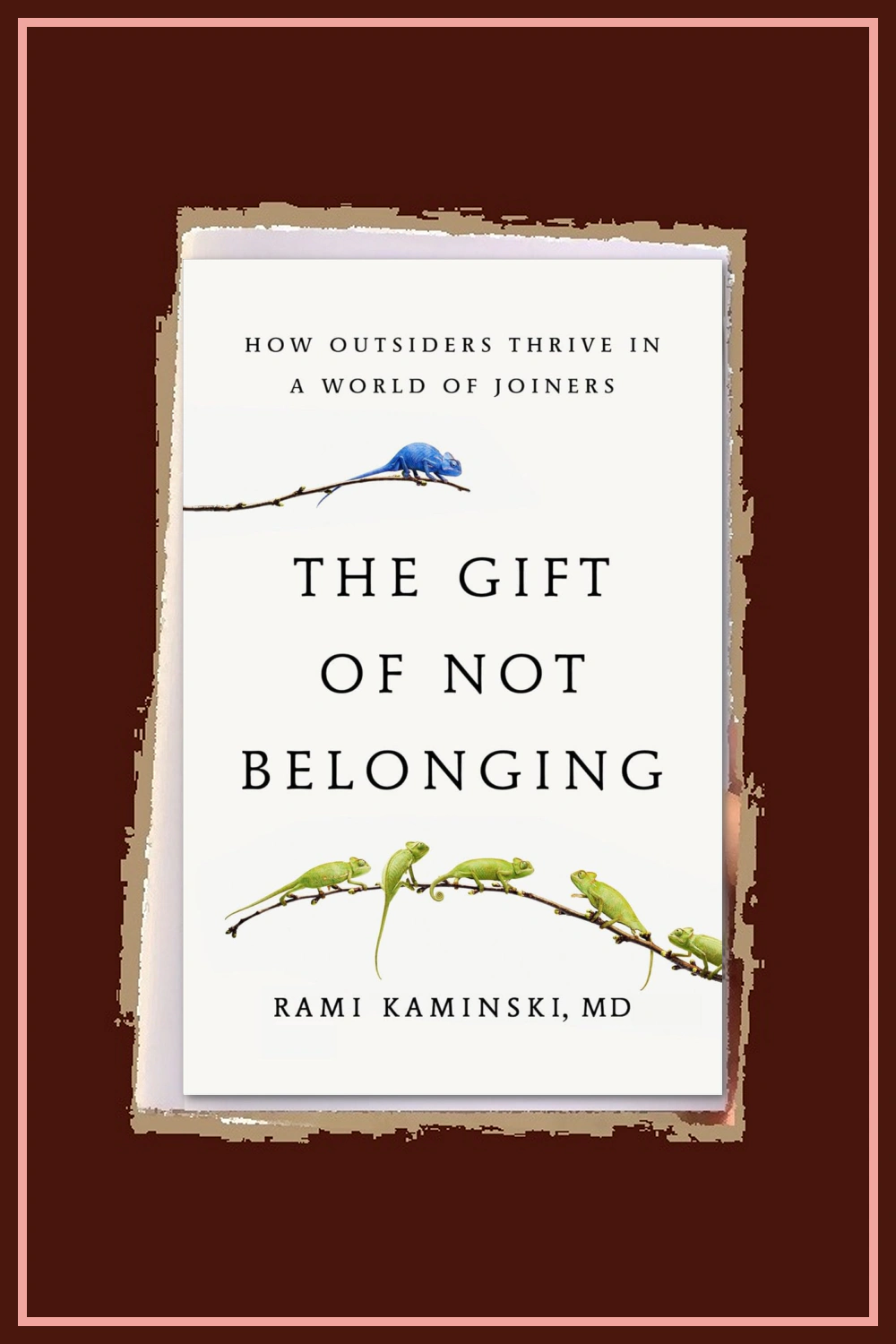Today's Sunday • 9 mins read
— By Dr. Sandip Roy.
Unbelonging: The feeling that you do not belong to a group, person, or place.
Someone described it perfectly: “I feel like I’m standing just outside the circle. Close enough to hear the conversation, but not close enough to join it.”
If belonging is that warm feeling of “Yes, this is my place, these are my people,” then unbelonging is the persistent sense that wherever you are, it will never feel like your people or your place.
Unbelonging hurts, more than we admit. You feel like a stranger in a land of knowns, geographically present but emotionally distant.
- Sitting at the family dinner table, feeling like an outsider.
- Showing up to work every day, but never feeling part of the team.
- Being at a party where everyone seems to know each other’s inside jokes … except you.
- Walking into a room and finding everyone lowering their voice so you don’t get to hear them.
Unbelonging & Loneliness
- Unbelonging is the feeling that you don’t quite fit in with the people in a place, even when there are many meaningful things in common.
- Loneliness is a feeling of isolation. Lonely people feel they have nothing meaningful in common with people in their lives.
- When you feel unbelonged, the agency is with the others. You realize you will never be included, even in spaces where you are invited and welcomed.
- When you feel lonely, the agency is with you. You feel safe that you belong somewhere, and can go to places where you really connect with people.

The Physical Weight of Unbelonging
When you don’t belong, your body gives out distress signals. Your shoulders tense up. Breathing gets shallow. Your face shows signs of fear.
Then your brain starts racing with questions like:
- “Why can’t I connect?”
- “What’s wrong with me?”
- “Am I even supposed to be here?”
These physical reactions happen because belonging is survival. Our brains are wired to seek social connection; they kept our ancestors alive.
Social rejection is painful (Brooks & Cordero, 2025). When we feel excluded, our nervous system treats it like a threat. The pain of social rejection lights up the same brain regions as physical pain.
Sarah, a friend, moved to a new city for work. She found a great Japanese restaurant and her favorite gym close to her apartment. On paper, everything looked perfect. But six months in, she called to say, “I have everything that I had there, go everywhere, but I’m not really here. I feel invisible.”
That’s unbelonging. You can have all the right pieces in place and still feel like you’re watching your life from the outside.
The Many Faces of Not Fitting In
Unbelonging shows up differently for everyone.
- Some people experience it much like loneliness in crowds.
- Some get it as imposter syndrome. You secretly feel that your achievements are not that important, and you’re fooling everyone into thinking you deserve to be there.
For people from marginalized backgrounds, unbelonging can be especially sharp. When you’re the only one who looks like you in a meeting, or when your cultural references don’t land, the message is clear: this space wasn’t made for you.
I remember talking to Marc, the first person in his family to go to college. He described feeling split in two: too “educated” for his old neighborhood, and too “street” for his new environment. He said, “I code-switch so much, sometimes I forget which version of me is real.”
Young people feel this intensely too. Everyone’s trying to figure out who they are while desperately wanting to fit in somewhere, anywhere.
The Quiet Devastation
What makes unbelonging so painful is how it compounds. The alienation finds its way inside from the outside.
When others make you feel you don’t belong, you start questioning yourself: What’s wrong with you that’s keeping them away?
Then, there’s that half-hope. You analyze every interaction, looking for proof that you’re unwanted. You become hyperaware of your differences.
It gets exhausting. You spend so much energy trying to decode social situations that you have little left to just enjoy them.
You start declining invitations, despite wanting to go. The risk of feeling unbelonged in this new place again feels too high.
The cruel irony is that the more you withdraw, the more isolated you become. It’s a spiral that feeds itself.
When Belonging Becomes Performance
Sometimes we think we’ve found our place, but we’re actually just “performing the belonging act.”
We laugh at jokes we don’t find funny. We agree with opinions we don’t share. And we hide so many parts of ourselves that we think others won’t recognize us if they know the true us.
This kind of conditional belonging is almost worse than not belonging at all. You’re constantly on edge, afraid that if people see the real you, they’ll reject you.
You’re included, but you’re not seen.
I’ve watched friends exhaust themselves trying to be the version of themselves they think others want. They get invited to things, sure, but they’re inviting a character, not a person.
The Ripple Effects of Unbelonging
Unbelonging spills over to other areas of your life.
When you feel like an outsider at work, it affects your confidence at home. When you don’t fit in with your friend group, it makes you question your worth as a partner.
It can make you smaller. You stop sharing your ideas because you assume they won’t be valued.
You stop taking up space because you don’t feel entitled to it. Somewhere down, you start living like you’re apologizing for existing.
The saddest part is how it can become a self-fulfilling prophecy:
- When you assume you won’t fit in, you don’t try as hard to connect.
- As you expect rejection, you build distances and put up walls.
- Your behavior starts matching your beliefs about yourself.
A Book That Gets It: “The Gift of Not Belonging”
Dr. Rami Kaminski’s “The Gift of Not Belonging” refuses to comfort you with easy answers. Kaminski, a psychiatrist, writes with the authority of someone who’s lived this experience.
He acknowledges that being an outsider doesn’t feel good. Then he offers a detailed map of why it feels the way it does and what you gain from walking this path.
The book is grounded in neuroscience. Social exclusion triggers a physiological stress response. Your brain registers it as a threat and reflects it in your biology.
Kaminski argues that the same stressed system builds something remarkable in you. When you feel like an outsider, your brain develops specific strengths.
Chronic low-grade stress sharpens pattern recognition, observation, and critical thinking.
You learn to scan for subtle social cues, read between the lines, and spot inconsistencies in environments. This hypervigilance forms the foundation for creative and original thought.
Social exclusion keeps you from decision-making by group consensus. This distance prods you to protect your values and independent thinking.
That lonely space between you and the crowd becomes a place where original ideas emerge. Groupthink loses its grip when you were never fully inside the group to begin with.
Context switching, or moving between different social or cultural worlds, builds flexibility and empathy. You learn to see situations from multiple angles, to grasp different viewpoints, in an increasingly complex world.
Without ready-made tribal membership, you’re forced to construct your own meaning. You build identity piece by piece from your values, experiences, and curiosities. No one hands you a purpose. The path takes longer and feels lonelier. It stays more truthful.
Kaminski provides a way to transform the pain of exclusion. You can redirect the energy spent on masking or longing into creative work, focused craft, or purpose-driven missions.
Give yourself permission to stop contorting yourself into spaces that don’t fit. If you’ve spent your life feeling like a perpetual visitor, “The Gift of Not Belonging” reads like a long-awaited debrief that helps you understand what that hurt has built in you.
The Search For Home
Despite the pain, most of us keep searching for belonging. We want to get to a place where we drop the pretense, and don’t need to perform the socializing game.
We try new groups, new activities, and even new versions of ourselves. And that’s healthy.
Sometimes we find it in unexpected places. Finally finding your people on a trip to a foreign land, after years of feeling alone. A random conversation with a stranger at a coffee shop. An online community where people share your-type weird interests.
But belonging is also about finding the right relationship with yourself. When you stop abandoning yourself to fit in, you start attracting people who appreciate who you genuinely are.
The Courage To Be Seen
The hardest part about belonging is that it requires vulnerability. You have to show up as yourself, not as someone others want you to be.
You have to risk rejection to find a real connection.
That’s terrifying when you’ve been hurt before. When you’ve been made to feel like you’re too much or not enough, the idea of being authentic feels dangerous.
Final Words
Unbelonging hurts because connection matters. The pain points us toward what we need: to be seen, accepted, and valued for who we are. It is also an indicator nudging us to find people and places where we do.
Your belonging is not a prize you have to earn. It’s something you’ll naturally get when the right people are around. After all, there is a little unbelonging in all of us.
Here’s what I’ve learned:
The people who reject the real you weren’t your people anyway.
The people who are meant for you, not some polished version of you, are waiting to meet you when you get off the sets of the social game show.
• • •
√ Also Read: 10 Hidden Signs of Loneliness: Being Lonely In A Crowd
√ Please share this if you found it helpful.
» You deserve happiness! Choosing therapy could be your best decision.
...
• Disclosure: Buying via our links earns us a small commission.

